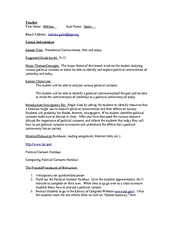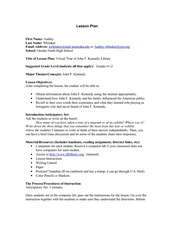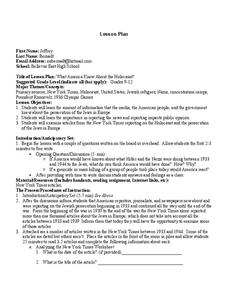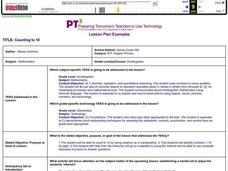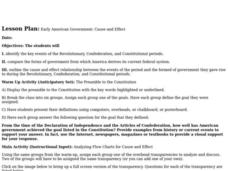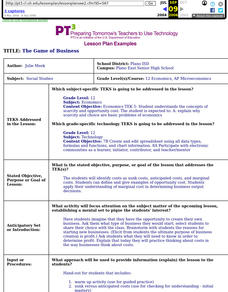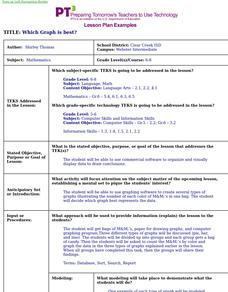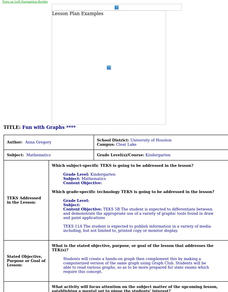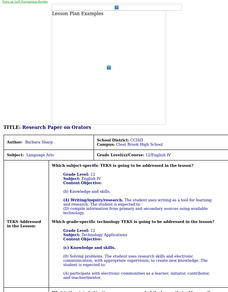Curated OER
The Great Depression Changes Ameirican Life
Students examine the impact of the Great Depression. In this Great Depression lesson, students research employment opportunities during the era. Students determine how they may have been able to survive the economic depression if they...
Curated OER
The World of Constitutions: Better Understanding the U.S. Constitution
Learners examine the purpose of constitutions. In this government systems lesson, students analyze the sections of the U.S. Constitution. Learners then compare the U.S. Constitution to the constitutions of other countries. Students write...
Curated OER
Why the US Fought and Lost the Vietnam War
Students examine the role of the United States in the Vietnam War. In this Vietnam War lesson, students research primary and secondary sources to find out why the United States was involved in the war and why it was unsuccessful in the war.
Curated OER
Presidential Controversies: Then and Today
Students explore presidential controversies. In this political cartoons lesson, students locate political cartoons that reflect presidential controversies. Students then respond to analytical questions pertaining to the cartoons they...
Curated OER
Technology Shrinks the World
Students examine the impact of inventions. In this technological advancements instructional activity, students compare the technology of the past to the technology of today. They identify inventions that were not available to their...
Curated OER
Virtual Tour of John F. Kennedy Library
Students take a virtual tour of the John F. Kennedy Presidential Library. For this Kennedy presidency lesson, students access the library via the Internet and take notes on the experience. Students write essays using the information they...
Curated OER
Who is Who in the Old West?
Learners consider the backgrounds of those who settled the Old West. In this Westward Expansion lesson, students participate in a simulation that requires them to role play miners, ranchers, Native Americans, Chinese, African Americans,...
Curated OER
What America Knew About the Holocaust?
Students examine American involvement in World War II. For this World War II lesson, students discuss the Holocaust and its implications. Students read New York Times articles regarding the treatment of Jews during the war. Students...
Curated OER
Multiplication and Division with Arrays
Students practice the commutative property, create and manipulate arrays and multiply and divide numbers.
Curated OER
Ordinals
Students examine uses for ordinal numbers in calendars, and an ordinal chart. They order ice cream cone cut outs from 1st to 20th and complete a worksheet. (not given)
Curated OER
Counting to 10
Students count to 10 by using cheerios as manipulatives, identify numbers 1-10 by sight, and go to a website by using the Internet and computer keyboard (numeric) to answer questions (with help of teacher).
Curated OER
Rainbow Fish Graphing
Pupils graph different colors of rainbow fish scales after participating in a shared reading of The Rainbow Fish. They answer questions based on the graph. They practice making graphs independently using colored cereal circles.
Curated OER
Nonprofit or For-Profit?
Students discuss different community organizations. In this philanthropy lesson plan, students define for-profit and nonprofit organizations. They identify examples of both and discuss the common themes and characteristics of each group.
Curated OER
Nonprofit or For-Profit?
Learners explore the concept of philanthropy. In this philanthropy lesson, students compare and contrast nonprofit and for-profit organizations.
Curated OER
Early American Government: Cause and Effect
Young scholars explore cause and effect. In this early American government lesson, students research the series of events that led to the revolution, confederation, and constitution. Young scholars use cause and effect examples to...
Curated OER
Job Shadow/Internship
Young scholars identify a career field to research and complete a job shadow activity. In this career exploration activity, students brainstorm a list of careers they are interested in and research them. Young scholars participate in a...
Curated OER
Problem Solving for Leaders
Students identify and explore ways leaders solve problems. In this leadership lesson, students use the FCCLA planning process to solve a given problem. Students report to the class the problem and their solution.
Curated OER
Project Whistlestop
Students conduct research and present a part of Kansas City history to the class. They develop questions and ideas to initiate and refine research. They use technological tools and other resources to locate, select and organize information.
Curated OER
The Entrepreneur's Game
Twelfth graders explore the basic principles of the US free enterprise system. They examine the basic principles of the US free enterprise system including profit motive, voluntary exchange, private property rights, and competition.
Curated OER
The Market Power Game
Students play a game to evaluate the power of competition in the four types of market structures. They describe characteristics and give examples of pure competition, monopolistic competition, oligopoly, and monopoly.
Curated OER
The Game of Business
Students practice the economic concepts of scarcity and opportunity cost. They imagine creating their own businesses and brainstorm what they need to know in order to determine when the business is profitable.
Curated OER
Which Graph is best?
Students use commercial software to organize and visually display data to draw conclusions; students use graphing software to create several types of graphs illustrating the number of each color of M&M's in one bag.
Curated OER
Fun With Graphs
Students create a hands-on graph then complement this by making a computerized version of the same graph using Graph Club. They read various graphs, so as to be more prepared for state exams which require this concept.
Curated OER
Research Paper on Orators
Twelfth graders identify the difference between a primary and a secondary source, and use writing as a tool for learning and research. They compile information from primary and secondary sources using available technology.
Other popular searches
- Anticipatory Sets in Science
- Math Anticipatory Sets
- Physics Anticipatory Sets
- Anticipatory Sets in History





